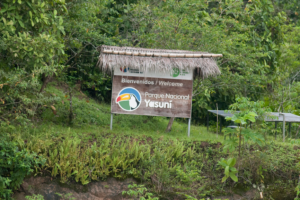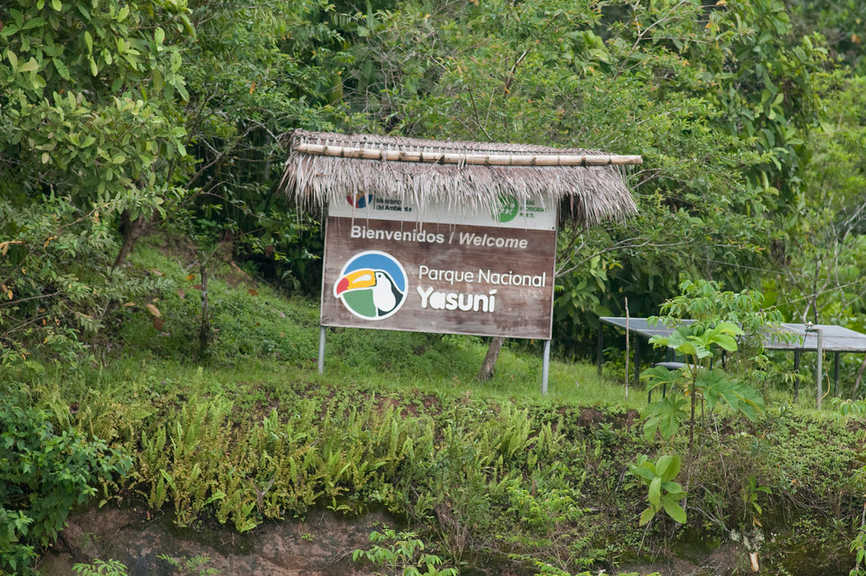
Amongst the barrage of near-constant lousy news on the climate, from record rain bombs and flooding to relentless heat domes and wildfires, comes historic great news.
After decades of chronic pollution and a David versus Goliath fight by the Indigenous communities against Big Oil, the people of Ecuador have voted in a referendum against drilling for oil in one protected area of the Amazon.
Ecuadorians have voted overwhelmingly to stop oil exploration in the highly contested Block 43 in the Yasuni National Park in the Amazon, which encompasses one million hectares inhabited by the “uncontacted” Tagaeri and Taromenani tribes.
The region is one of the most biologically diverse regions in the world and is home to hundreds of bird species, amphibians, and reptiles. The result will also mean over 700 million barrels of oil stays in the ground.
The victory cannot be overstated. The fight against first Texaco (which became Chevron) and Petroecuador, the state oil company in the Ecuadorian Amazon, is one of the iconic battles by frontline communities in the dirty history of Big Oil.
It is nearly twenty-five years since Judith Kimerling’s ground-breaking booklet Amazon Crude was published, detailing Texaco’s devastation of oil in Ecuador. Even then, over one million hectares of rainforest had been impacted, with nearly 17 million gallons of oil spilt by the Trans-Ecuadorian pipeline. Hundreds of wells produced over 4.3 million gallons of toxic waste daily. Much of this leaked into local rivers and watercourses. This poisonous legacy continues to this day.
A referendum on oil in the region was first mooted in 2007 when then-President Rafael Correa announced that Ecuador would refrain from oil exploration in Block 43 if Ecuador received billions in compensation. As that money was never forthcoming, Correa announced that oil exploration could proceed in August 2013.
After a decade of campaigning by Indigenous communities and their allies for a referendum under the banner of the Yasunidos movement, a decade later, the country’s Supreme Court ruled that a referendum should take place to coincide with this year’s election. The first vote in the election happened last weekend.
As the Associated Press puts it: “The outcome represents a significant blow to Ecuadorian President Guillermo Lasso, who advocated for oil drilling, asserting that its revenues are crucial to the country’s economy.”
Petroecuador, the state oil company, will now have to shut down its operations in Yasuni, which currently produces 60,000 barrels a day. The result is also a setback for current Ecuadorian President Guillermo Lasso, who favored oil drilling.
However, the battle against oil in the Amazon is not over, with other blocks still active. But still, it is a moment to savor in the fight for Indigenous and climate justice.
Nemo Guiquita, a leader of the Waorani tribe, told The Associated Press: “Ecuadorians have come together for this cause to provide a life opportunity for our Indigenous brothers and sisters and also to show the entire world, amidst these challenging times of climate change, that we stand in support of the rainforest.”
Nemonte Nenquimo, an Indigenous Waorani leader and winner of the Goldman Prize for the environment, also said that “today is a historic day. As a Waorani woman and mother, I feel overjoyed with Ecuadorians’ resounding decision to stop oil drilling in my people’s sacred homeland.”
Nenquimo added: “Finally, we are going to kick oil companies out of our territory! This is a major victory for all Indigenous peoples, for the animals, the plants, the spirits of the forest and our climate!” she added.
Leonidas Iza, president of CONAIE, Ecuador’s umbrella Indigenous federation, added, “This victory shows that we humans are taking action to save our planet during these times of climate crisis.”
Youth Kichwa Sarayaku community environmental activist Helena Gualinga told Democracy Now! “It’s really, really important on a national level but also for the world. It sets a crucial precedent for all Indigenous territories in the Amazon as well as for the world.”
Outside of the Amazon, others celebrated too: Dorothy Guerrero, head of Policy and Advocacy at Global Justice Now, said: “Ecuador’s landmark decision gives us all hope. It’s possible to say no to the oil giants who are wrecking our planet. Indigenous communities in Ecuador have tirelessly campaigned for this for more than a decade and that effort built the widespread support across the nation that delivered this verdict. It makes Ecuador a global trailblazer.”
Others took to Twitter, now named X, to celebrate:
It’s time to celebrate!!!!
People Power beat back Big Oil! #Ecuador has just become the 1st country in the world to halt oil drilling through direct climate democracy!
Celebrate this historic moment by telling your friends & family! #YestoYasuní! #SiAlYasuní pic.twitter.com/vB8voW4ZF3
— AFrontlines (@AFrontlines) August 21, 2023
“Today we made history!
This consultation, born from the people, demonstrates the greatest national consensus in Ecuador. It is the first time that a country decides to defend life and leave oil underground.
It is a historic victory for Ecuador and for the planet!”#SÍalYasuní https://t.co/HXAWltSxWa
— Amazon Watch (@amazonwatch) August 21, 2023
Yesterday Ecuadorians made history! They voted to leave crude oil in the
ground at #Yasuni !
They voted for life! Victory for Ecuador. Victory for the Planet!
Real climate action #KeepItInTheGround pic.twitter.com/Tjf0ctLjwc— Nnimmo (@NnimmoB) August 21, 2023

